- Home
- Robert J. Mrazek
Dead Man's Bridge Page 2
Dead Man's Bridge Read online
Page 2
I moved another five feet along the railing and trained the beam on the man’s face again. His grotesquely swollen eyes were staring vacantly across the gorge toward the campus bell tower. Like every dead man I’ve seen, his eyes reflected no light. The front of his shirt was crimson with blood.
I had never seen rope burns cause such a wound. Whatever had actually snared him around the neck was buried deep inside the skin and had apparently caused the profusion of blood.
The dawn light was bringing everything into focus, and I turned off the flashlight. As I moved away from the railing, I felt something dislodge from its surface and caught it in my left hand. It was a small slick of caked brown mud. There was a second clot about twelve inches farther along the top of the railing. Walking along the edge, I spotted three more.
“I’ll take over from here, Officer Cantrell,” came a deep voice from the residential side of the bridge.
I turned back to see Captain Janet Morgo coming toward me. Ken Macready, a new provisional security officer, was right behind her. Beyond Macready, I saw Captain Morgo’s SUV parked in the middle of the street. She hadn’t activated the strobe lights on the roof rack.
Captain Morgo was dressed in the uniform she had personally designed for the campus security force after she had been appointed to the job. The blouse and pants were a matching burgundy with a thin band of gold piping down the pants’ seams and gold thread stitched around the pockets. The hat had enough scrambled eggs on the brim to satisfy a French admiral. Someone in the office told me it had won a fashion award at the national campus security officer’s convention.
Her Glock 17 pistol was holstered on the belt that rested on her hips, along with several leather pouches holding her flashlight, cell phone, and stun gun. There was nothing soft or feminine about her. She was six feet tall, husky, and powerful. I had seen her bench-press three hundred pounds in the campus gym.
Before taking over the campus force, Captain Morgo had been in charge of the county juvenile detention home. When it came to management style, she took no prisoners. It was as if she thought that being feminine in any way would undercut her authority.
“Another suicide,” she stated matter-of-factly.
I shook my head.
“I think it’s a crime scene, Captain. We’ll know more when the sheriff’s investigative unit arrives.”
I heard a screen door slam in the distance and looked back toward the residential side of the bridge. A few people were coming out of one of the houses, apparently drawn by the police car parked in the middle of the street. Word would now travel fast. Captain Morgo turned back to face me.
“I told Carlene not to call them,” she said, the burgundy material of her uniform straining across her chest. “This is homecoming weekend. It’s obvious we have another jumper here. As soon as we recover the body, I’ll notify the Groton Police Department and then the county coroner. He can verify it. Now let’s get him up.”
“I believe this man could have been murdered,” I said.
“So you say,” she said, glancing back at the growing crowd of onlookers massing at the edge of the bridge. “He’s the second jumper this year. We don’t need to hold up a billboard to the world about these things.”
I got the picture. In other words, our benevolent alumni would be less likely to open their checkbooks if confronted by the scene of one of their brethren hanging from the same bridge that was on the cover of the reunion booklets.
“We should bring in the sheriff’s crime unit on this,” I said without trying to sound confrontational. “This man is not an emotionally troubled student, and I’ve found several signs that point to someone else being involved in his death.”
She sniffed the air between us like a point setter.
“Have you been drinking, Officer Cantrell?” she demanded.
I pointed down at the reunion cup at our feet.
“I smelled it too.”
A small swarm of rubberneckers was approaching the bridge from the neighboring houses. Their voices rose as the first arrivals pointed out the still-swaying body to the rest of them.
“We can sort all this out later. Let’s bring him up now,” she said, leaning over to get a better view of the body. “Officer Macready and I will untie the rope and pull him up to the railing. Then I’ll hold the line while the two of you lift him over the edge.”
“I’d like to get another rope from my truck and get it around his body,” I said. “The man’s neck—”
“I’m in charge here, Officer Cantrell,” she interrupted me. “You’ve heard my orders. Now let’s roll.”
As she loosened the stopper hitch, the rope slid down a few inches before she wrapped her powerful hands around it and heaved upward. Ken Macready stepped up to help her, and they began raising the body in a smooth hand-over-hand technique.
Bent over the railing, I watched the corpse rise upward. As was often the case in the moment of death, his sphincter had let go, and the smell wafted toward me as the swinging body drew near the edge of the steel underpinning.
“Stop,” I called out as his shoulder lodged under one of the girders.
“What the hell are you doing?” demanded Captain Morgo, her face flushed with exertion. “Let’s get him up here.”
I could see that the snare was tightening around his neck under the additional drag. The man’s head suddenly canted over to the left at an unnatural angle.
“Loosen the rope,” I said.
The thick braided cord jerked down a foot or so, and his pinned shoulder came loose from under the girder.
“He’s free,” I said.
The swaying body rose toward my outstretched hands. I was reaching down to grab his right shoulder when I heard a loud squishy pop. It sounded like a soldier’s boot being extracted from molasses-thick mud. A moment later, the man’s head separated from his body.
A loud collective gasp came from the people at the overlook as his body began its long plunge to the bottom of the gorge. It landed spread-eagled on a massive flat rock in the middle of the torrent.
Incredibly, the man’s head remained suspended in the air a few feet below the bridge, the garroted stub of his spinal column still rooted within the wire snare that had severed his neck.
“Mother of God,” groaned Ken Macready when he looked over the edge. He crumpled in a heap on the footpath.
The crowd fell silent as the man’s head continued to sway slowly back and forth at the end of the wire, his reunion cap tightly clamped over the grayish-blonde hair. Using my left hand, I gently pulled on the rope to bring him toward me.
He was an inch or two from my outstretched fingers when the head toppled free from the snare. Someone at the overlook let out a cry. A few seconds later, his head splashed into the roiling water below us. It bobbed to the surface for a moment as the cataract of water carried it along the rock-strewn canyon.
Captain Morgo was standing motionless beside me, peering down at the man’s head as it disappeared over the first waterfall. I glanced at her hip to see whether she was carrying her VHF radio along with the rest of her tools. She wasn’t. I began sprinting toward her squad car.
A bald man in pajamas was filming the scene from the edge of the overlook to the bridge. Plucking the camcorder out of his hands, I headed straight for the cruiser. Opening the driver’s-side door, I grabbed the VHF radio from the charging unit on the communications console and punched in the emergency frequency monitored by the county sheriff’s office and the Groton Police Department.
“This is Jake Cantrell, St. Andrews campus police,” I said, keeping my voice steady. “We have a five-niner at the suspension footbridge over the Fall Creek Gorge. It’s a possible code two. Send an investigative team immediately.”
The sheriff’s dispatcher immediately confirmed the request. I told the Groton police dispatcher to have the fire department send its rescue crew to the base of the falls in order to try to intercept the victim’s head before it was carried into the lake.
>
There was a pause before I heard the dispatcher say, “Roger . . . will instruct.”
I could only imagine their joint reaction to that piece of news. Outside the captain’s SUV cruiser, the bald man whose camcorder I had grabbed was pounding on the window and demanding that I give it back to him. Swinging open the door, I stepped out, still holding the camera in my hand. Seeing me towering over him, he took a step backward.
“You can pick the camera up at the campus security office after we have examined the recording,” I said. “Thank you for being a good citizen.”
In the distance, I could hear the repeated echo of emergency sirens as I passed through the crowd.
“I think that’s Jake Cantrell,” said a man in the crowd.
“Jesus, it is him . . . it’s the Tank,” came back a second man.
The two male alumni were about my age. Both were wearing green-and-white St. Andrews replica football jerseys. One of them looked about six months pregnant. The other was clutching a bottle of Guinness in his right hand.
“Wish you were starting at fullback today, Jake,” he called out as I moved through the crush. Ken Macready was standing guard at the entrance to the bridge. His young freckled face looked queasy. Two thin strings of vomit pasted one of his shoes.
“Sorry, Jake,” he said.
“Don’t worry about it,” I said, giving his shoulder a tap. “The sheriff’s crime unit ought to be here any minute. In the meantime, I think you should seal off the bridge at both ends with crime tape and get all the license plate numbers on those cars in the overlook lot. One of the owners might have seen something last night, and they should be interviewed as soon as possible.”
“Yes, sir,” he said.
“The emergency phone under the blue light at the edge of the gorge is missing. Whoever did this might have thrown it down there. It’s worth a search in case there are prints.”
“Yes, sir,” he repeated.
I was still holding the camcorder.
“Take this back to the office when you’re finished. It probably doesn’t have anything worthwhile on it, but at least we won’t be looking at a video of that man’s head on the Internet.”
As Ken started walking toward the police cruiser, I called him back. “Before you do anything else, use the camera to film everyone standing around the overlook.”
“Yes, sir,” he repeated again.
Captain Morgo hadn’t moved from the spot where the man’s body had been hanging. She stood there with her hands on her hips, glowering at me as if I were responsible for losing his body.
The end section of braided rope was still hanging over the railing. Lashed to it was a foot-long length of galvanized wire, the bloody loop tightened to a diameter of less than an inch.
It was concertina, the razor-sharp stuff we had used to protect our base camps in Afghanistan. Just a few weeks earlier, I had seen a roll of it being uncoiled around a local construction site after some local environmentalists had sabotaged one of their bulldozers.
“He was probably partying near here,” I said to Captain Morgo, securing the rope and removing my work gloves. “My guess would be one of the fraternities over there. He looked the type.”
“I’m well aware of your brilliance as a leader of men,” she said, continuing to glare at me as two sheriff’s cruisers raced to a stop behind the captain’s SUV. A rescue vehicle from the Groton Fire Department arrived right behind them. The hulking figure of Sheriff Jim Dickey emerged from the second car and began striding toward the bridge.
“You are relieved,” said Captain Morgo, as if she was George Patton and I had just failed to take Sicily.
I was limping away when she called out, “You aren’t in proper uniform, Officer Cantrell.”
I was still wearing the blue pullover I had slept in, along with jeans and sneakers. I considered telling her what I thought of her uniform but then thought better of it. After only six months on this job, my personnel folder was already filled with petty infractions. This one would probably dock another ten dollars off my monthly paycheck.
“You will report to me in proper uniform at oh nine hundred and be ready for a full inspection.”
I passed Sheriff Dickey as he was coming across the bridge.
“Hey . . . it’s the Soldier,” he called out to me with a contemptuous grin as we walked past each other. Muscled like a steer, Dickey was my height of six two, but at least two hundred and eighty pounds, with gray crew-cut hair and a lantern jaw. About fifty, he had been county sheriff for almost twenty years.
“You kill any of your own men this morning?” he asked.
I ignored him.
“’Course it’s still early yet,” came his gravelly voice from behind me.
I glanced up at the morning sky. It had turned from ash gray to a bird’s-egg blue. The big oaks and maples bordering the gorge seemed to take fire in the glow of the brilliant sun.
As I reached my pickup, a bright-red motorcycle came rumbling up the grade and pulled in at the overlook. It was an old Indian Scout, a classic that someone had lovingly restored.
The young woman riding it used her right foot to drop the kickstand after she braked to a stop. There was a police scanner mounted on the machine, and I could hear the chirping voice of a police dispatcher. In one smooth motion, she was off the motorcycle and headed toward the footbridge.
I stepped into the path ahead of her and held up my hand. She glanced up at the police badge on my pullover.
“This is a restricted area,” I said.
“I’m Lauren Kenniston of the Journal.”
In her late twenties, she was maybe five nine with a slim, athletic figure. She was wearing exactly what I was wearing, a pullover and jeans, but with riding boots instead of sneakers. She had probably been asleep when the call came over the scanner.
“That’s great, but we’re investigating a death on the bridge,” I said. “No one is allowed out there right now except law enforcement.”
“According to the report I monitored on my home scanner, it involves a headless corpse.”
I was played out, or I would have kept my mouth shut.
“You’ll need to talk to Ichabod Crane about that,” I said. “Just don’t come any closer.”
Her big green eyes flashed with anger under a coronet of auburn hair.
“I have every right to cover a story affecting our readers,” she said. “Let me talk to your superior.”
She looked past me toward the bridge and called out, “Sheriff Dickey?”
I turned and saw Big Jim heading back toward us.
“Is this loser bothering you?” he called out as he came up.
“He is refusing to let me go down to the bridge.”
“He has as much authority here as a warm bucket of spit. This is the famous Jake Cantrell. You probably read about what he did in Afghanistan. We had officers like him in ’Nam, and they usually got fragged. You should do a story on him.”
“I’ll sure think about it,” she said.
“You come along with me,” he said, putting his arm around her shoulder and leading her down toward the bridge. “It’s all over though. Looks like another jumper.”
She briefly glanced back at me as he led her down the path.
3
As I watched from the cab of my pickup, the Groton Fire and Rescue Squad unpacked its emergency gear, and two men prepared to rappel down the wall of the gorge to reach the dead man’s body.
Captain Morgo was still standing in the middle section of the bridge next to Jim Dickey. She had lit her corncob pipe and was pointing authoritatively down toward the lower falls. The reporter was standing alongside them.
When I turned around, I noticed a green Volvo parked along the other side of the road. I knew the car. It belonged to Jordan Langford, the president of St. Andrews College, and the man who had gotten me the job on the campus force.
I found it odd that Jordan could have already heard about the man’s death. Carlene woul
d never have called him at home, and I was sure Captain Morgo would not have done so until she had personally checked out the scene.
Jordan emerged from the car and stood gazing out at the activity in the middle of the bridge for almost a minute, his mocha skin contrasting dramatically with the white tennis shirt and shorts he was wearing. I expected him to go down to the bridge, but instead he pulled a cell phone from his pocket and punched in a number. He said a few words into it, then got back in his car and drove away.
As I headed back down the steep grade, Ken Macready was standing unobtrusively in the shadows under the trees and filming the crowd of onlookers with the confiscated camcorder. He was going to be a good officer.
Farther down Campus Hill, the Fall Creek Tavern was open and already doing a thriving business. Through the windows, I could see more than a dozen men and women sitting at the bar in preparation for their daily challenge of remaining upright on their stools for most of the day. I was tempted to stop for a confidence builder but decided to go home and clean up for the captain’s inspection.
Groton Lake lay tranquil as I pulled into the hard-packed gravel driveway behind my cottage. It was an old one-story cabin constructed with hand-hewn logs. There was a big stone fireplace in the pine-paneled living room. The primitive bathroom featured a claw-footed white enamel tub.
Bug greeted me at the door with a single wag of her bushy tail. I went to the refrigerator and removed the pot of garlic-flavored chicken I had prepared the previous evening. After heating a portion in a saucepan, I softened two cups of her favorite kibble with the broth and served it to her on the screened porch.
For almost a minute, she stared down at the chicken as if it were laced with strychnine. Then she began gazing across the expanse of Groton Lake as if contemplating a swim.
“Come on, baby,” I said.
It was getting almost impossible to coax her to eat. Sometimes she went a day or two without consuming anything but water, and I would be reduced to pleading with her. As I was now. I selected a small slice of chicken out of her bowl and chewed it with gusto.

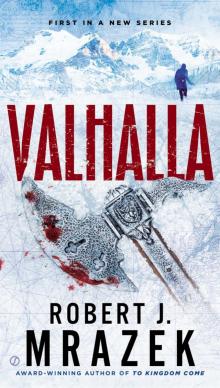 Valhalla
Valhalla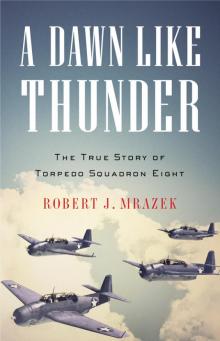 A Dawn Like Thunder
A Dawn Like Thunder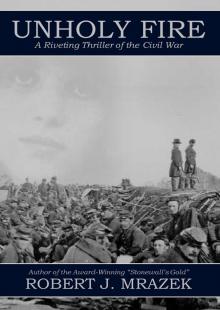 Unholy Fire
Unholy Fire To Kingdom Come
To Kingdom Come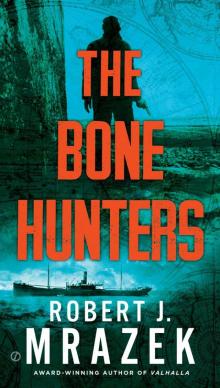 The Bone Hunters
The Bone Hunters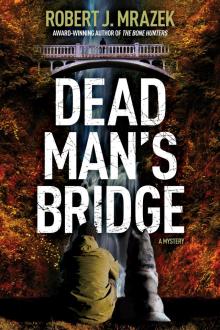 Dead Man's Bridge
Dead Man's Bridge